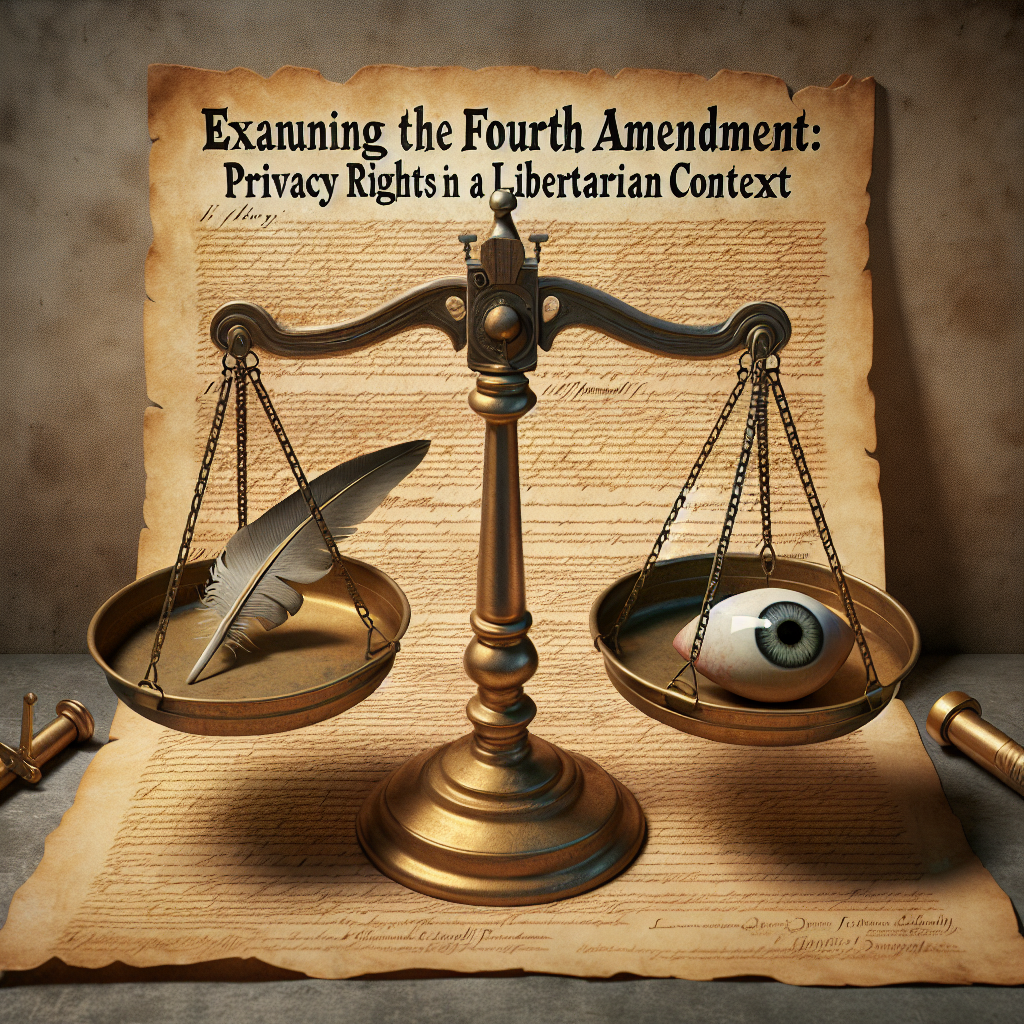Examining the Fourth Amendment: Privacy Rights in a Libertarian Context
The Fourth Amendment to the United States Constitution is a cornerstone of American civil liberties, providing protection against unreasonable searches and seizures. This article delves into the implications of the Fourth Amendment on privacy rights, particularly from a libertarian perspective, which champions individual freedom and minimal government intervention.
Understanding the Fourth Amendment
Text of the Amendment
The Fourth Amendment states: "The right of the people to be secure in their persons, houses, papers, and effects, against unreasonable searches and seizures, shall not be violated." This legal protection serves as a fundamental barrier against government overreach, ensuring that citizens maintain a degree of privacy in their lives.
Historical Context
The framers of the Constitution were acutely aware of the abuses of power that had taken place under British rule. The Fourth Amendment was designed to prevent arbitrary intrusions and to establish a framework for the legal conduct of searches and seizures. Understanding its historical roots is essential for grasping its relevance in today’s society.
Libertarianism and Individual Privacy
Core Libertarian Principles
Libertarianism is grounded in the principles of individual liberty, personal responsibility, and limited government. Central to this philosophy is the belief that individuals should have the autonomy to control their own lives, free from unnecessary interference. In this context, the Fourth Amendment’s protections resonate strongly with libertarian values.
Privacy as a Fundamental Right
For libertarians, the right to privacy is integral to individual freedom. Privacy is not merely the absence of interference but a crucial aspect of personal sovereignty. The Fourth Amendment’s emphasis on protecting citizens from unwarranted intrusion reinforces the libertarian ideal that each person owns their own body and private information.
The Intersection of Technology and Privacy
Modern Challenges to the Fourth Amendment
In today’s digital age, the challenges to privacy rights have evolved significantly. With the rise of technology, there is an increasing concern about government surveillance, data collection, and the erosion of privacy. Libertarians warn that these practices may infringe upon the rights protected by the Fourth Amendment.
Case Studies: Surveillance Programs
Several high-profile cases illustrate the tension between national security and individual privacy. Programs like the NSA’s warrantless surveillance operations raise questions about the balance between protecting citizens and respecting their privacy rights. Libertarians argue that such practices violate the spirit of the Fourth Amendment and threaten personal freedoms.
Judicial Interpretations of the Fourth Amendment
Key Supreme Court Decisions
Over the years, the U.S. Supreme Court has offered various interpretations of the Fourth Amendment that have shaped its application. Landmark cases such as Mapp v. Ohio and Katz v. United States have expanded the understanding of what constitutes an "unreasonable" search or seizure. These rulings reflect evolving definitions of privacy and the importance of judicial oversight in protecting individual rights.
The ‘Reasonable Expectation of Privacy’ Doctrine
The concept of a "reasonable expectation of privacy" has become a legal standard in Fourth Amendment cases. Libertarians argue that this doctrine is subjective and can lead to inconsistencies in protecting privacy rights. A clearer, more robust application of the Fourth Amendment could better safeguard individual liberties.
The Future of Privacy Rights in a Libertarian Framework
Advocacy for Stronger Protections
Libertarians advocate for more stringent protections against government intrusion in the name of privacy. This includes promoting transparency in surveillance practices, pushing for legislative reforms, and encouraging individuals to take control of their own data. There is a growing movement to strengthen the Fourth Amendment in response to contemporary privacy challenges.
The Role of Technology and Personal Responsibility
As technology continues to advance, the interplay between privacy rights and individual responsibility becomes critical. Libertarians emphasize that while the government has a role in protecting privacy, individuals must also be proactive in safeguarding their personal information. This dual approach can create a more robust framework for privacy in a libertarian context.
Conclusion: Upholding Privacy Rights in a Libertarian Society
The Fourth Amendment remains a vital protector of privacy rights in the United States. Analyzing it through a libertarian lens emphasizes the importance of individual freedoms and minimal state interference. As society grapples with the implications of technology and surveillance, the principles outlined in the Fourth Amendment must be upheld to ensure a future where privacy rights are respected and preserved.
By understanding and advocating for these rights, individuals can contribute to a society that prioritizes liberty and personal autonomy—core tenets of the libertarian philosophy.
Share this content:












Post Comment